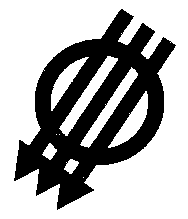“The name of the path is class struggle. The goal is the nation.” The national-bolshevist perspective on class struggle, by ‘Social-Revolutionary Nationalist’ Georg Osten

Radicalization was one of the defining features of Germany’s youth movement in the late 1920s, as it was for so many other sectors of German society. The country’s ongoing economic difficulties, its continued ‘subjugation’ under foreign powers, the seemingly moribund culture of its dominant right-wing forces, and the increasing tendency of its nationalist paramilitaries and parties to participate in the political mainstream via electoral politics had all engendered a strong sense of frustration and disillusionment in many of the idealistic patriots who made up much of the youth movement. The dire circumstances brought about by the onset of the Great Depression heightened these sentiments dramatically, leading many young nationalists, already dabbling in anti-capitalist and anti-bourgeois sympathies, to the conclusion that there might actually be an element of truth to Marxist critiques of capitalism and imperialism after all. A growing sympathy and appreciation for communism developed within segments of the youth movement as a result, leading to the emergence of a new variety of left-wing nationalism and to numerous attempts at forging a common political front between the country’s national-revolutionary forces on the one hand and the Soviet-backed Communist Party of Germany (Kommunistische Partei Deutschlands, KPD) on the other. The organization at the forefront of this new wave of ‘national-communism’ was the Group of Social-Revolutionary Nationalists (Gruppe sozialrevolutionärer Nationalisten, GSRN), founded on Ascension Day 1930 out of an amalgamation of various youth associations and one of the few entities to openly call itself “National Bolshevist.” Those affiliated with the GSRN, who like their principal spokesman Karl Otto Paetel were almost all intellectuals of middle-class origin, actively collaborated with the KPD and its front organizations and incorporated core conceits of revolutionary Marxism into their own nationalist worldview, proselytizing for a political ideology which placed Germany’s hopes for national liberation in the hands of the proletariat and in the ideal of violent class struggle. The article translated below, by Social-Revolutionary activist Georg Osten, presents the GSRN’s perspective on the issue of the class struggle and its centrality to the group’s nationalist ambitions. Originally published in national-revolutionary journal Die Kommenden in June 1930, Osten’s article was later reproduced in the 1930 booklet Sozialrevolutionärer Nationalismus, which effectively served as the GSRN’s programme for most of its existence.
Nationalism and Class Struggle
By Georg Osten
1930

One certainly need not agree with Karl Marx’s thesis that all history is the history of class struggles in order to be capable of acknowledging that this proposition is at least thoroughly accurate to our time. There is no denying the fact that all struggles, of both a foreign-policy and domestic-political nature, take place upon the plane of economic struggle. Just a few years ago it was almost impossible to speak of class struggle as a historically-conditioned fact in circles which call themselves national or nationalist, but the events of the past seven years have brought about a remarkable transformation. It was previously considered good form, so to speak, to depict the class struggle as a perfidious invention of Jews and Freemasons who, in some clandestine gathering, had decided upon the destruction of the unified German nation [deutschen Einheitsvolkes]. Nobody wished to acknowledge that a development had taken place here which was conditioned by the expansion of industrial production capacities within the framework of the capitalist system.1
Only in more recent years has there been a growing understanding of the era-conditioned and natural processes known as ‘class struggles’. And yet already are our friends2 once again engaged in explaining that this notion has in actuality already been surmounted today, since a propertied class in the old sense no longer exists – and after all, every director, even in the largest companies, is only an employee of anonymous capital. Undoubtedly there is some truth to this argument. But they forget that what ultimately matters here in the end are facts, that a very significant proportion of the German Volk, on account of their bourgeois (class) educational privilege and the senseless contortion of the term ‘national’ into meaning ‘property protection’, feel compelled to (even without, in the strictest sense, actually belonging to the propertied class themselves) side with the numerically small group of actual capitalists and to thereby help stabilize the concept of this class. Furthermore, something which should not be overlooked is that very large segments of the middle-class, dispossessed by inflation, earnestly desire to see pre-war conditions restored, at least in terms of the economy, and thereby hope to become small capitalists again themselves. The lion’s share of the bourgeoisie have not yet realized that a process has occurred before our eyes which, in a certain sense, can already be termed a kind of ‘expropriation of the expropriators’, although for the time being this expropriation has taken place to the benefit of High Finance as the leading international global power. Incidentally, this development was foreseen by Marx and by his associates many decades beforehand. And in this context it is not without interest to cite the words of a well-known social-reformist: “Ever more powerfully are capital and labor shaping the means of power which they mobilize in their class struggles. These struggles are becoming ever more colossal, their goals ever more extensive; more and more do they move the whole of society, with every class growing more and more interested in the results. These social struggles are increasingly becoming the focal point of public life in our time. This, and not the mitigation of class antagonisms, is the consequence of the proletariat’s surmounting of the capitalist tendency towards impoverishment via its ascendancy in victorious class struggles.” (Karl Kautsky in the Heidelberg Programme of the SPD, page 15/16.)3 Continue reading





